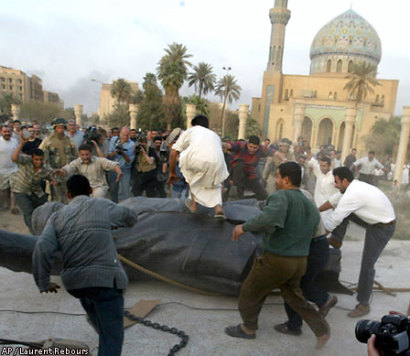 “Who hath trodden under foot the Son of God, and hath counted the blood of the covenant…an unholy thing?” Hebrews 10:29
“Who hath trodden under foot the Son of God, and hath counted the blood of the covenant…an unholy thing?” Hebrews 10:29
After Saddam Hussein’s statue had been toppled in central Baghdad ’s Paradise Square , pent-up emotion burst forth from those who had felt the scourge of the Iraqi dictator. Many expressed their disdain of Hussein in a way commonly understood in Middle Eastern culture: they stomped on anything tied to him. One news story reported that “Kuwaitis have been vilified in the Arab world for supporting the US led war but locals now feel vindicated by TV pictures of jubilant Iraqis stomping on images of Saddam Hussein.”
The bible uses graphic images to convey penetrating messages. These images often become universal symbols. In this way, the feet, and by association, the shoes, represent power and authority over something or someone. Joshua called for the men of Israel to “Come near, put your feet upon the necks of these kings. And they came near, and put their feet upon the necks of them. (Joshua 10:24.) The prophet Malachi wrote “And ye shall tread down the wicked; for they shall be ashes under the soles of your feet. (Malachi 4:3.) This symbol culminates in a powerful verse in Romans 16:20 , “And the God of peace shall bruise Satan under your feet shortly.”
With this tradition comes a warning: be careful what you step on. Anything you put your shoes on means you despise it. Indeed, God indicated this very thought to Moses in Exodus 3:5. “And he said, Draw not nigh hither: put off thy shoes from off thy feet, for the place whereon thou standest is holy ground.” God was saying to Moses, “Take care how you stand in my presence. Don’t be crude, insensitive or uncaring of my holiness. Let your very demeanor acknowledge who I am.” While God reached out to Moses via the burning bush, he demanded profound respect from Moses.
This warning bears repeating today. In their zeal to expand the frontiers of evangelism, some have confused free salvation with cheap salvation. But we must not re-cast God’s grace into a Big-Lots-type buyout frenzy. Shoving aside the essence of God’s perfection, whether ignorantly or presumptuously, imperils our relationship to God. Is it possible for anyone who has known the grace of God to fall from that grace…or for a friend of God to become his enemy? Paul thought so. “Christ is become of no effect unto you,” whosoever of you are justified by the law; ye are fallen from grace.” (Galatians 5:4). The smaller the impact Calvary makes on our lives, the more it shrinks into insignificance. Gradually, salvation becomes a meaningless exercise in semantics.
Do you have blood on your shoes? Do you hate your brother? Do you love the world? Are you abiding in Christ? Are you continuing to commit sin? “Love not the world, neither the things that are in the world. If any man love the world, the love of the Father is not in him. For all that is in the world, the lust of the flesh, and the lust of the eyes, and the pride of life, is not of the Father, but is of the world. And the world passeth away, and the lust thereof: but he that doeth the will of God abideth for ever. (1 John 2:15-17.) What about s ins of commission? Sins of omission? Prejudice and racism? An attitude of superiority? Sowing of discord? Gossip and backbiting? Hypocrisy? Stealing? Lying? Pornography? Cursing? Withholding God’s money? Defiling the temple of God ? Trusting in uncertain riches? Check your shoes.
Where is the blood of Christ in your life? “ But if we walk in the light, as he is in the light, we have fellowship one with another, and the blood of Jesus Christ his Son cleanseth us from all sin.” (1 John 1:7). We need to clean the precious blood of Christ from our shoes and apply it to our hearts! When we walk in sincerity and purity, we walk in power! It is not enough to be doctrinally correct. We must have purity in our lives as well. For the grace of God that bringeth salvation hath appeared to all men, Teaching us that, denying ungodliness and worldly lusts, we should live soberly, righteously, and godly, in this present world; Titus 2:11-15.